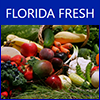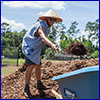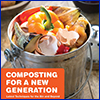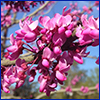In February’s issue of the Neighborhood Gardener, the focus is on compost, mulch, and soils. This issue also includes information about new gardening resources and features the February Plant of the Month: Eastern Redub. You can access the full newsletter, here, or read on for a synopsis of each article
The Neighborhood Gardener is the monthly e-newsletter from the University of Florida Master Gardener Volunteer Program and the Florida-Friendly Landscaping™ Program. Through it we’ll share information on state happenings and useful resources. Click here to sign up to receive the newsletter the second Friday of each month.
New Resources for Florida’s Gardening Communities
 Did you know that the “Florida Vegetable Gardening Guide” is UF/IFAS Extension’s most popular document? It received over 113,000 views in 2020 alone. As we begin 2021 we’re excited to highlight new ways Floridians can access and use this research-based guide. Read on to learn about the Florida Fresh web tool, the 2021 edition of our “Edibles to Plant” infographics, and the Guía para Cultivar Vegetales en la Florida!
Did you know that the “Florida Vegetable Gardening Guide” is UF/IFAS Extension’s most popular document? It received over 113,000 views in 2020 alone. As we begin 2021 we’re excited to highlight new ways Floridians can access and use this research-based guide. Read on to learn about the Florida Fresh web tool, the 2021 edition of our “Edibles to Plant” infographics, and the Guía para Cultivar Vegetales en la Florida!
Choosing and Installing Mulches
 Wendy Wilber is often asked, “Which turf is best for deep shade?” She answers easily: mulch. This updated article answers common mulching questions and includes an expanded list of mulch types. Water savings, erosion control, weed suppression, and of course aesthetic appeal — there are so many reasons to add mulch to your landscape!
Wendy Wilber is often asked, “Which turf is best for deep shade?” She answers easily: mulch. This updated article answers common mulching questions and includes an expanded list of mulch types. Water savings, erosion control, weed suppression, and of course aesthetic appeal — there are so many reasons to add mulch to your landscape!
 Gardening and landscaping in Florida can be a challenge. The growing climate is agreeable, but many parts of Florida have soils that are tough to grow in. They can be clay, rock, or deep sands depending where you live. For most of the state we have very sandy soils. Gardeners have asked me, “Why is the soil so sandy?” The answer to that lies in ancient history. Which leads to the next question: What are we to do with these deep sandy soils that most of peninsular Florida contends with?
Gardening and landscaping in Florida can be a challenge. The growing climate is agreeable, but many parts of Florida have soils that are tough to grow in. They can be clay, rock, or deep sands depending where you live. For most of the state we have very sandy soils. Gardeners have asked me, “Why is the soil so sandy?” The answer to that lies in ancient history. Which leads to the next question: What are we to do with these deep sandy soils that most of peninsular Florida contends with?
 Our first title of 2021 is “Composting for a New Generation.” And we’re excited to announce that in late March, author Michelle Balz will be joining us for a live book club meeting with our host Wendy Wilber. It’s not too late to start reading, gardeners!
Our first title of 2021 is “Composting for a New Generation.” And we’re excited to announce that in late March, author Michelle Balz will be joining us for a live book club meeting with our host Wendy Wilber. It’s not too late to start reading, gardeners!
Plant of the Month: Eastern Redbud
 Redbud’s rapid growth and small size make it an excellent choice for gardeners hoping to add color or fill an empty space in the landscape. This species (Cercis canadensis) is a close relative of beans, peas, peanuts, tamarind, and other legumes. The family resemblance seems slight until late summer, when the tree bears hundreds of bean pods! This small native tree erupts with pink or white flowers on its bare branches in the spring. It grows across the eastern half of the United States, from USDA Hardiness Zones 4 to 9A.
Redbud’s rapid growth and small size make it an excellent choice for gardeners hoping to add color or fill an empty space in the landscape. This species (Cercis canadensis) is a close relative of beans, peas, peanuts, tamarind, and other legumes. The family resemblance seems slight until late summer, when the tree bears hundreds of bean pods! This small native tree erupts with pink or white flowers on its bare branches in the spring. It grows across the eastern half of the United States, from USDA Hardiness Zones 4 to 9A.
 February is an ideal time to prune roses. Prune to remove damaged canes and improve the overall form. After pruning, fertilize and apply a fresh layer of mulch. In South Florida, winter vegetable gardening is in full swing, with February being the last month to plant cantaloupes, cucumbers, eggplant, lettuce, peppers, spinach, and tomatoes for a late spring harvest. North and Central Florida gardeners should plant potatoes this month.
February is an ideal time to prune roses. Prune to remove damaged canes and improve the overall form. After pruning, fertilize and apply a fresh layer of mulch. In South Florida, winter vegetable gardening is in full swing, with February being the last month to plant cantaloupes, cucumbers, eggplant, lettuce, peppers, spinach, and tomatoes for a late spring harvest. North and Central Florida gardeners should plant potatoes this month.
For more month-by-month gardening tips, check out the Florida Gardening Calendar. Three different editions of the calendar provide specific tips for each of Florida’s gardening regions—North, Central, and South.
 0
0
